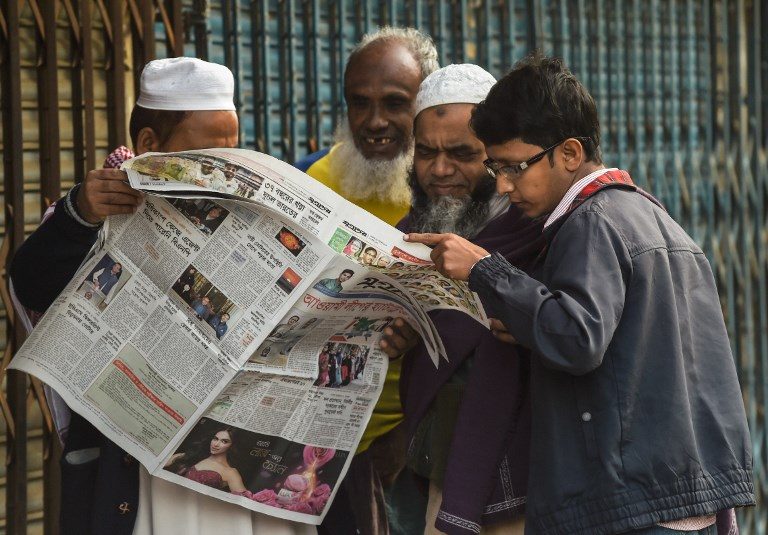SUMMARY
This is AI generated summarization, which may have errors. For context, always refer to the full article.

DHAKA, Bangladesh – Bangladesh Prime Minister Sheikh Hasina was declared the landslide winner Monday of an election marred by deadly violence that the opposition slammed as “farcical” and rigged.
Hasina’s ruling Awami League party and its allies won 288 seats in the 300-seat parliament, with the main opposition securing only 6 seats, Election Commission secretary Helal Uddin Ahmed said. (READ: Bangladesh election campaign ends in anger)
Sunday’s vote, which hands Hasina a record 4th term, was overshadowed by clashes between rival supporters that killed at least 17 people and allegations of ballot box stuffing and intimidation at polling stations. (READ: Bangladesh journalists attacked ahead of poll)
Hasina’s government had mounted a crackdown on the opposition, an alliance led by the Bangladesh National Party (BNP), which urged the country’s election commission to void the results.
“We are demanding that a fresh election is held under a neutral government as early as possible,” Kamal Hossain, who heads the alliance, told reporters.
Deadly violence that blighted the election campaign spilled over into voting day, even as authorities imposed tight security with 600,000 troops, police and other security forces deployed across the country.
Thirteen people were killed in clashes between Awami League and BNP supporters, police said, while 3 men were shot by police who said they were protecting polling booths.
An auxiliary police member was also killed by armed opposition activists, according to officials.
‘We’ll cast your vote’
Hasina, 71, has been lauded for boosting economic growth in the poor South Asian nation during her decade in power and for welcoming Rohingya refugees fleeing a military crackdown in neighboring Myanmar.
But critics accuse her of authoritarianism and crippling the opposition – including arch-rival and BNP leader Khaleda Zia who is serving 17 years in prison on graft charges.
The opposition alliance accused Hasina’s party of using stuffed ballot boxes and other illegal means to fix the result.
BNP spokesman Syed Moazzem Hossain Alal said there were “irregularities” in 221 of the 300 seats contested.
Bangladesh election commission spokesman S.M. Asaduzzaman told Agence France-Presse the body had “received a few allegations of irregularities” and was investigating.
Hasina has not responded to the accusations but said in the run-up to the vote that it would be free and fair.
One voter, Atiar Rahman, said he was beaten by ruling party activists in the central district of Narayanganj.
“They told me not to bother, ‘We’ll cast your vote on your behalf’,” he told Agence France-Presse.
The opposition said the unrest was stirred up to deter voters, and presiding officers reported a low turnout across the country.
Sunday’s deaths brought to 21 the official police toll for election violence since the ballot was announced on November 8.
Free and fair?
Experts say Hasina’s victory will be sullied by accusations that she hamstrung opponents.
“This result might affect our democratic system and might also damage state institutions,” Sakhawat Hussain, a former election commissioner, told AFP.
A man on the streets of Dhaka Monday who was too scared to give his name said: “What is the point of saying anything? We have to accept the results and the fact we have a crippled opposition.”
The opposition claims some 15,000 of its activists were detained during the campaign, crushing its ability to mobilize support.
Thirty-five of its candidates were either arrested over what they said were trumped-up charges or disqualified from running by courts, which Hasina’s opponents say are government controlled.
The United States and the United Nations raised concerns about the credibility of the election while Human Rights Watch and other international groups said the crackdown had created a climate of fear.
The leadership of Bangladesh has alternated between Hasina and Zia, allies-turned-foes, over the last three decades.
Hasina’s victory secures her third consecutive term in office, and fourth overall.
A daughter of Bangladesh’s first president Sheikh Mujibur Rahman, Hasina was gifted victory in the 2014 election when the BNP boycotted the vote claiming it was not free and fair.
Rights groups have since accused her administration of stifling freedom of speech by toughening a draconian anti-press law and the enforced disappearance of dissenters.
Hasina rejects accusations of authoritarianism but analysts say she feared young voters would support the BNP.
Her government was criticized this year for its heavy handling of weeks of major student protests that brought Dhaka to a standstill. – Rappler.com
Add a comment
How does this make you feel?
There are no comments yet. Add your comment to start the conversation.